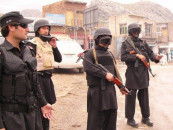SDPI seminar: ‘Policy research by Islamabad-based experts neglects provinces’
Think tanks in the capital need to interact with provincial policymakers.

“Out of around 70 centres involved in policy research in the seven areas, 32 are based in Islamabad,” says Nadeem.
Most organisations conducting policy-oriented research are located in Islamabad and their research engages mostly with policymakers at the federal level.
This centralised flow of policy and research is quickly becoming problematic in the country’s post-18th Amendment governance landscape, where the provinces will be making their own policies.
These were some of the findings of a mapping report commissioned by the Sustainable Development Policy Institute (SDPI) at a seminar in Islamabad on Monday.
Titled “Landscaping Policy Relevant Research in Pakistan: Identifying the Key Actors,” the report surveyed the public and private research institutes working in the country in seven areas, Economics, agriculture, health, governance, poverty and peace and conflict. The information was collected through interviews by a team of seven researchers.
The findings were shared by Arif Nadeem, a doctoral student at the University of Cambridge, who worked on the report. “Out of around 70 centres involved in policy research in the seven areas, 32 are based in Islamabad,” Nadeem said.
Public financing was mostly limited to public institutions or channelled through the Higher Education Commission (HEC) to universities. But HEC funds are mostly spent on science rather than policy-related research, Nadeem said. “The rest of the research is mostly funded by multinational donor agencies.”
Nadeem also gave an overview of the exact nature of research being done by research centres in the seven areas.
Tariq Banuri, who moderated the seminar, said universities are often a great source of research in countries where there are multi-tiered structures of policy making.
But academic research at Pakistani universities is not up to the mark, he added.
Published in The Express Tribune, January 1st, 2013.



















COMMENTS
Comments are moderated and generally will be posted if they are on-topic and not abusive.
For more information, please see our Comments FAQ